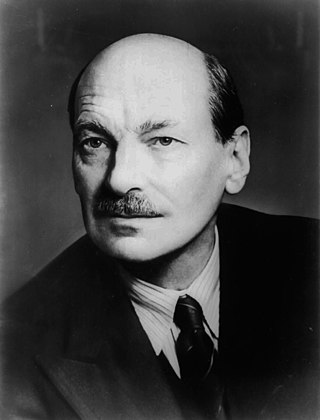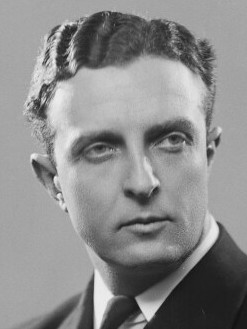Related Research Articles

The Liberal Party was one of the two major political parties in the United Kingdom, along with the Conservative Party, in the 19th and early 20th centuries. Beginning as an alliance of Whigs, free trade–supporting Peelites, and reformist Radicals in the 1850s, by the end of the 19th century, it had formed four governments under William Ewart Gladstone. Despite being divided over the issue of Irish Home Rule, the party returned to government in 1905 and won a landslide victory in the 1906 general election. Under prime ministers Henry Campbell-Bannerman (1905–1908) and H. H. Asquith (1908–1916), the Liberal Party passed reforms that created a basic welfare state. Although Asquith was the party leader, its dominant figure was David Lloyd George.

The 1945 United Kingdom general election was a national election held on Thursday 5 July 1945, but polling in some constituencies was delayed by some days, and the counting of votes was delayed until 26 July to provide time for overseas votes to be brought to Britain. The governing Conservative Party sought to maintain its position in Parliament but faced challenges from public opinion about the future of the United Kingdom in the post-war period. Prime Minister Winston Churchill proposed to call for a general election in Parliament, which passed with a majority vote less than two months after the conclusion of the Second World War in Europe.

The 1950 United Kingdom general election was the first to be held after a full term of a majority Labour government. The general election was held on Thursday 23 February 1950, and was also the first to be held following the abolition of plural voting and university constituencies. The government's lead over the Conservative Party shrank dramatically, and Labour was returned to power but with an overall majority significantly reduced from 146 to just 5. There was a 2.8% national swing towards the Conservatives, who gained 90 seats. Labour called another general election the following year, which the Conservative Party won, returning Churchill to government after six years in opposition.
The National Labour Organisation, also known simply as National Labour, was formed in 1931 by supporters of the National Government in Britain who had come from the Labour Party. Its leaders were Ramsay MacDonald (1931–1937) and his son Malcolm MacDonald (1937–1945).

North Ayrshire and Arran is a constituency of the British House of Commons, located in the south-west of Scotland within the North Ayrshire council area. It elects one Member of Parliament (MP) at least once every five years using the first-past-the-post voting system of voting.

The 2005 United Kingdom general election was held on Thursday 5 May 2005, to elect 646 members to the House of Commons. The governing Labour Party led by Prime Minister Tony Blair won its third consecutive victory, with Blair becoming the second Labour leader after Harold Wilson to form three majority governments. However, its majority fell to 66 seats; the majority it won four years earlier had been of 167 seats. The UK media interpreted the results as an indicator of a breakdown in trust in the government, and especially in Blair.

The 2010 United Kingdom general election was held on Thursday 6 May 2010, to elect Members of Parliament to the House of Commons. The election took place in 650 constituencies across the United Kingdom under the first-past-the-post system. This was the first election held after the age of candidacy was reduced from 21 to 18. The election resulted in a large swing to the opposition Conservative Party led by David Cameron similar to that seen in 1979, the last time a Conservative opposition had ousted a Labour government. The governing Labour Party led by Prime Minister Gordon Brown lost the 66-seat majority it had previously enjoyed, but no party achieved the 326 seats needed for a majority. The Conservatives won the most votes and seats, but still fell 20 seats short. This resulted in a hung parliament where no party was able to command a majority in the House of Commons. This was only the second general election since the Second World War to return a hung parliament, the first being the February 1974 election. This election marked the start of Conservative government for the next 14 years until the July 2024 Election.
Wednesbury was a borough constituency in England's Black Country which returned one Member of Parliament (MP) to the House of Commons of the Parliament of the United Kingdom from 1868 until it was abolished for the February 1974 general election.

The 1936 Combined Scottish Universities by-election was a by-election held from 27 to 31 January 1936 for the Combined Scottish Universities, a university constituency of the British House of Commons.
Emlyn Hugh Garner Evans was a British barrister, Royal Air Force officer, and politician. Early in his career he adhered to the Liberal Party and was once arrested in Nazi Germany for expressing anti-fascist views. He later transferred to the Conservative-allied National Liberals and was elected to Parliament; however his continued allegiance to the Liberal side brought about a premature termination of his Parliamentary career.
The 1938 Lewisham West by-election was a parliamentary by-election held for the British House of Commons constituency of Lewisham West on 24 November 1938.
Sir Samuel Thomas Rosbotham, known as 'Sam Tom', was a British farmer and National Labour politician who served as the member of parliament for Ormskirk from 1929 to his resignation in 1939.
The 1973 Dundee East by-election, in Scotland, was held on 1 March 1973. It was one of three UK parliamentary by-elections held on that day. It was caused by the appointment of George Thomson as a European commissioner. George Machin retained the seat for Labour, but only narrowly. There was a strong showing by the Scottish National Party, which prefigured their serious breakthrough at the Govan by-election later in the year, and the two general elections of 1974.
The 1934 Lowestoft by-election was an election held for the House of Commons of the United Kingdom's constituency of Lowestoft, it was the first ever by election in the constituency. It was held on Thursday 15 February 1934, polling stations opened between the hours of 8 am and 10 pm.
The 1939 Holderness by-election was a parliamentary by-election held on 15 February 1939 for the British House of Commons constituency of Holderness in the East Riding of Yorkshire.
The 1939 Batley and Morley by-election was a parliamentary by-election held in the United Kingdom on 9 March 1939 for the House of Commons constituency of Batley and Morley in the West Riding of Yorkshire.

The 1939 Hythe by-election was a parliamentary by-election held on 20 July 1939 for the British House of Commons constituency of Hythe.

The 1938 Aylesbury by-election was a parliamentary by-election for the British House of Commons constituency of Aylesbury on 19 May 1938.
The 1952 Dundee East by-election was held on 17 July 1952, due to the death in a road accident of the incumbent Labour MP, Thomas Cook. It was won by the Labour candidate George Thomson.

The 2022 Havering London Borough Council election was held on 5 May 2022 to elect all 55 members of Havering London Borough Council. The elections took place alongside local elections in the other London boroughs and elections to local authorities across the United Kingdom.
References
- ↑ Leigh Rayment's Historical List of MPs
- ↑ Tom Stannage, Baldwin Thwarts the Opposition: The British General Election of 1935 (London: Croom Helm, 1980), p. 77.
- ↑ The Times, 23 May 1935